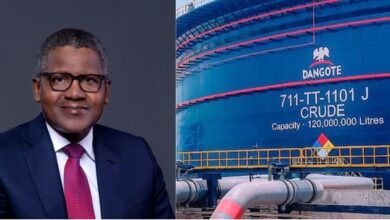
Chairman of CITA Energies Limited, Thomas Ogungbangbe, has appealed to the Federal Government to partner with the private sector in reactivating the inactive 98-kilometre aviation fuel pipeline stretching from Atlas Cove through Mosimi and Ejigbo to the Murtala Muhammed International Airport (MMIA), Lagos.
Speaking at the League of Airport and Aviation Correspondents (LAAC) colloquium themed “Aviation Fuel Business in Nigeria: The Scenario and the Metaphor” held in Lagos, Ogungbangbe explained that restoring the pipeline which has been shut down since 1998 following a reported incident would significantly reduce aviation fuel costs, cut logistics expenses, and ease traffic congestion caused by the daily movement of hundreds of fuel trucks within Lagos.
According to him, reviving the pipeline would not only cut costs but also strengthen Nigeria’s energy security and reduce capital flight caused by fuel vessels berthing in neighbouring countries.
Ogungbangbe estimated that restoring the pipeline could reduce aviation fuel prices by ₦30 to ₦40 per litre, resulting in significant savings for both airlines and passengers.
He revealed that bringing in a single vessel of fuel currently costs around $500,000, a figure that eventually drives up retail prices.
Commenting on the Dangote Refinery’s impact, Ogungbangbe acknowledged that while it has improved product availability, it has not yet led to substantial price reductions.
While expressing optimism, he said that as local refining stabilizes and critical infrastructure such as the restoration of Lagos Airport Pipeline,Nigeria will begin to experience the full economic benefits of domestic energy production and efficient distribution.
“Government should revisit the restoration of the 98 kilometers pipelines running from the Atlas Cove to the airports. There’s also the need to have hydrant pipes around. If this is done, it will keep away not less than 100 trucks from Lagos roads daily. The pipeline is still there underground, and I believe it can be revived with pressure testing and proper rehabilitation.
“If government agencies like NNPC, the Navy, the Nigerian Maritime Authority, and the Ministry Marine and Blue Economy collaborate with private operators, we can restore this line and eliminate the need for over 100 trucks on our roads every day.
“At the moment, vessels go as far as Togo to berth, and we spend millions of dollars monthly freighting products back to Nigeria. Some even go to other countries to dry dock because we haven’t developed that capacity here.
“If we fix this single piece of infrastructure, the ripple effects will cascade across the entire downstream value chain.
“It’s not just about cost efficiency, it’s about restoring Nigeria’s operational advantage and ensuring our systems work seamlessly without enriching neighbouring economies at our expense.
“When you spread that across the number of litres, you realize how much these logistics costs inflate the final price. If we can bring the products closer home through the pipeline, we can shave off these unnecessary costs.
“Dangote has been a blessing in terms of supply stability. However, the pricing still mirrors import benchmarks, and in many cases, some importers still manage to land products cheaper than the refinery’s local rate. At the moment, Dangote’s share of total aviation fuel consumption may not exceed 50 percent.”











One Comment